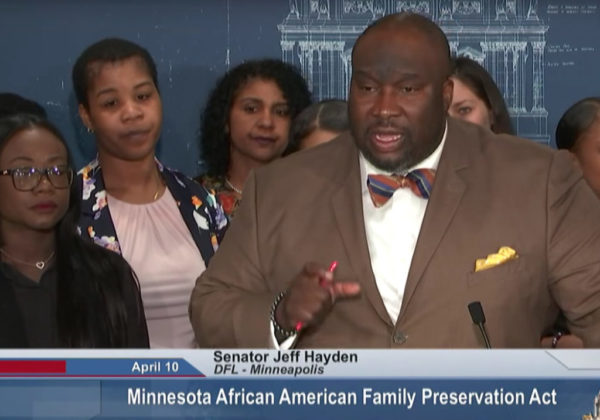Lawmakers in Minnesota have relaunched efforts to keep Black families together and intact by limiting out-home-placements of African-American children in the state’s foster care system.
On Monday, Rep. Rena Moran (Democratic Farmer Labor Party-St. Paul) and Sen. Jeff Hayden (DFL-Minneapolis) reintroduced legislation that would ensure families involved in child protection cases are together as much as possible, Minnesota Public Radio reported. The so-called Minnesota African-American Family Preservation Act also aims to establish a greater oversight when Black children are placed in foster homes, with lawmakers urging agencies to place these kids with relatives — not strangers.

Sen. Jeff Hayden argued that Black children removed from their homes should be placed with Black relatives/families so that they don’t lose their identity. (Image courtesy of The Chronicle of Social Change)
“The disparities in Minnesota’s child protection system are alarming,” said Claire Wilson, deputy commissioner of Minnesota’s Department of Human Services. “African-American children are more than three times as likely to experience out-of-home placement than white children.”
Data from the department also shows Black parents are more likely to lose custody of their children than their white, Asian and Hispanic counterparts. Now, lawmakers and others are actively working to address the discrepancies.
Moran and Hayden, who are both sponsoring the bill, introduced the same legislation last year, but it never made it to the floor for a vote. In just the last 10 years, Minnesota has seen its foster care numbers nearly double, and the number of “Child in Need of Protection or Services” cases involving Black families has jumped by more than 50 percent between 2013 and 2017, according to state juvenile courts data.
Mirroring the language the the Indian Child Welfare Act of 1978, the AAFPA seeks to curtail the “community-destroying” practice of removing African-American children from their homes only to place them with non-Black families. Hayden argued there are far too many examples of Black children raised in white households who end up losing their cultural identity.
“They grew up in a process in which they didn’t know who they were,” he said. “And subsequently, [they] had a lot of trouble dealing with society because they had no grounding.”
The bill is expected to get a hearing sometime this month, Moran said. She said she’s hopeful that Republicans will throw their support behind the proposal once they see the data and hear the stories of Black parents who’ve had their families ripped apart.
“Often the narrative is the Republican complaint that government needs to get out of people’s lives so that they can do what they need to do,” she said. “In this instance, that is our narrative.”


